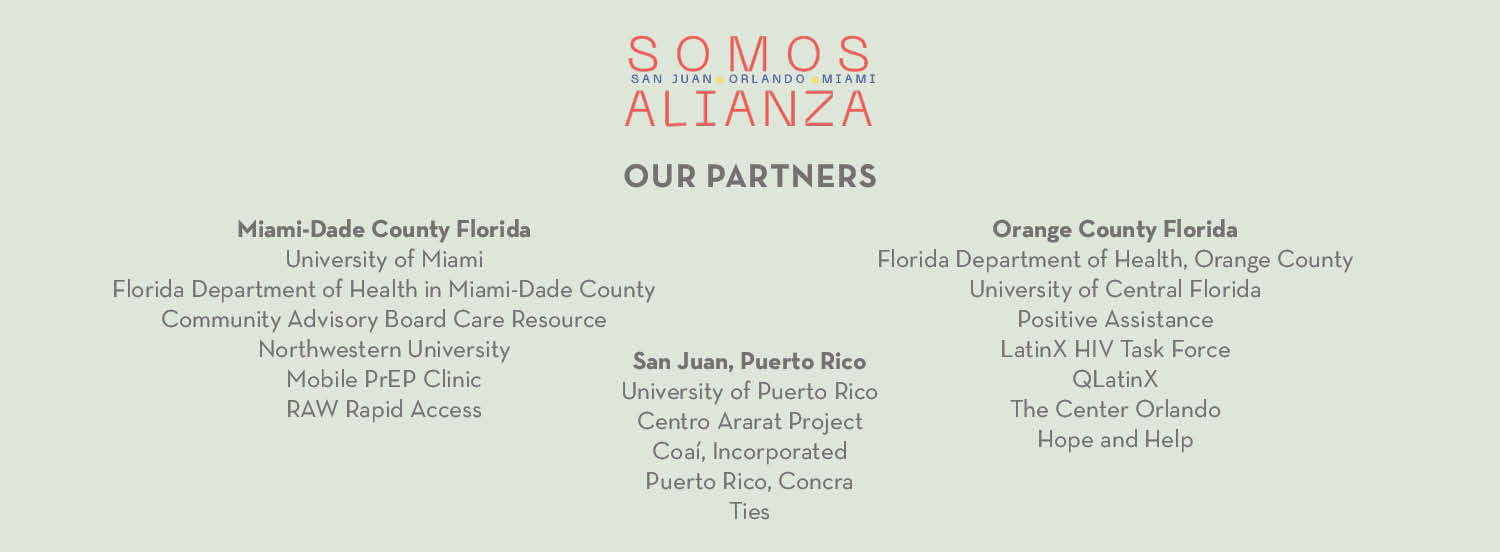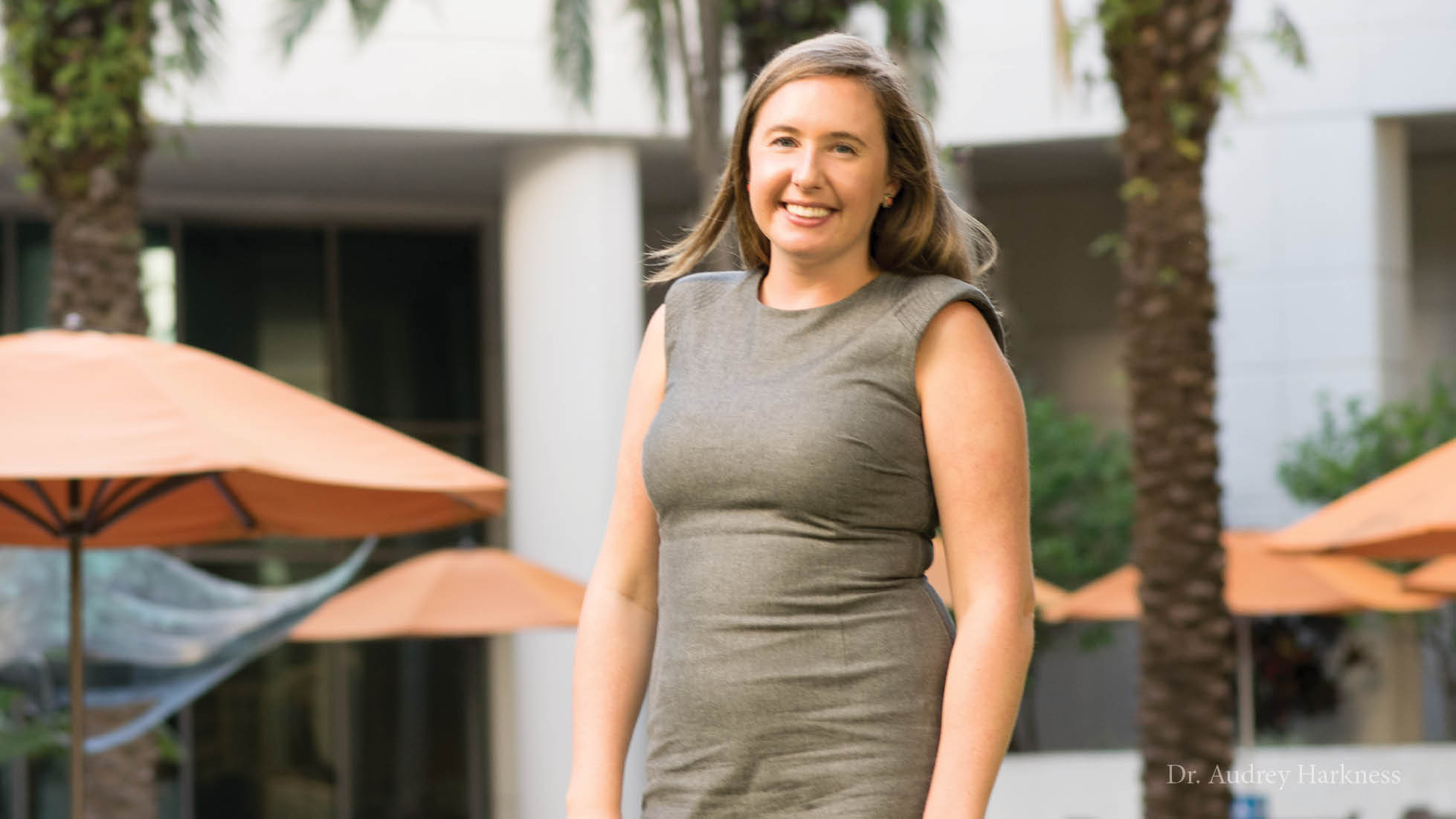The University of Miami (UM) School of Nursing and Health Studies (SONHS) is honored to announce that assistant professor Audrey Harkness, Ph.D., has been awarded a $3.8 million R01 grant from the National Institutes of Health’s (NIH) National Institute of Mental Health (NIMH). The five-year grant will support her new study, “Leveraging a Strategic Alliance of Community-Based Implementers and Researchers to Characterize, Protocolize, and Scale Up Local Implementation Strategies for Ending the HIV Epidemic among Latino MSM.” The NIH’s highly-competitive R01 grants are awarded to researchers with a proven track record of experience and expertise in their field and mark the recipient’s achievement of independent investigator status.
Dr. Harkness and her team will visit community organizations in Miami and Orlando, Florida, and San Juan, Puerto Rico, to identify and assess the strategies they are using to improve the reach of pre-exposure prophylaxis (PrEP) and mental health/substance use treatment to Latino men who have sex with men (MSM). The team will build an online dashboard to showcase the most promising strategies, making them available to other organizations serving Latino MSM in the United States.
“Often, researchers develop programs to bring HIV services into the community and then try to get organizations to implement them—but these programs aren’t always feasible in a real-world setting,” said Harkness. “This study is different because we’re taking the reverse approach: centering the knowledge and experience of community organizations and leveraging the strategies they’ve developed to engage Latino MSM.”
The study will assess each strategy to learn about how well it is working, whether it addresses key factors known to be important in increasing use of health care services, and whether it uses an effective method to promote behavior change. “Our approach upholds rigorous scientific standards,” said Harkness. “If a strategy meets these standards, we'll develop a protocol that other organizations can follow to use the strategy in their own setting.”
Dr. Harkness is a psychologist with years of training and experience working with sexual minority men in the areas of mental health, HIV, and public health, and leveraging implementation science to improve implementation of programs for sexual minority men. “Dr. Harkness is a promising new investigator who is already making her mark in the field,” said SONHS Dean and Professor Hudson P. Santos, R.N., Ph.D., F.A.B.M.R., F.A.A.N. “Her study addresses an urgent public health issue because Latino MSM are disproportionately impacted by HIV. And it’s transformational in its approach to identifying and scaling up community-generated strategies that can benefit other organizations across the nation.”
The new study responds to the “Ending the HIV Epidemic” (EHE) initiative for the US, which aims to reduce new cases of HIV in the US by 90 percent by 2030 through science-based strategies in the areas of diagnosis, treatment, prevention, and response. The study builds on formative work supported by an NIH “Ending the HIV Epidemic” administrative supplement awarded to Harkness through UM’s Center for HIV and Research in Mental Health (CHARM), which is led by Steven A. Safren, Ph.D.
As the study’s principal investigator, Harkness will collaborate with an expansive 30-member team of community-based implementers and researchers known as the “SOMOS Alianza” (San Juan, Orlando, Miami Organizational Strategic Alliance). Colleagues Edda Santiago Rodriguez, Dr.P.H., M.P.H., and Eric Schrimshaw, Ph.D., will serve as lead investigators at the University of Puerto Rico and University of Central Florida, respectively. The network will tap into community wisdom and organizational best practices across three EHE regions that share many commonalities and cross-geographical migration, yet experience their own barriers to sharing resources and information.
“Community organizations are often fragmented networks,” said Harkness. “This study allows us to be the bridge that helps to connect organizations to each other, so they in turn can help Latino MSM connect to the resources and treatments that work.”
Research reported in this publication was supported by the National Institute Of Mental Health of the National Institutes of Health under Award Number R01MH138237. The content is solely the responsibility of the authors and does not necessarily represent the official views of the National Institutes of Health.
###
About the University of Miami School of Nursing and Health Studies: The University of Miami School of Nursing and Health Studies (SONHS) transforms lives and health care through education, research, innovation, and service across the hemisphere. Established in 1948 as South Florida’s first collegiate nursing program, SONHS is a world-class, prestigiously accredited, research-driven school conferring undergraduate nursing, public health, and health science degrees, and advanced nursing degrees. SONHS values its diverse faculty, students, and 250+ clinical and community health partners. Its research core includes the Biobehavioral Research Laboratory, PAHO/WHO Collaborating Centre, Center for Latino Health Research Opportunities (CLaRO), Minority Health and Health Disparities Research Training Program, and 41,000-square-foot Simulation Hospital Advancing Research and Education (S.H.A.R.E.®). For more information, visit sonhs.miami.edu.


